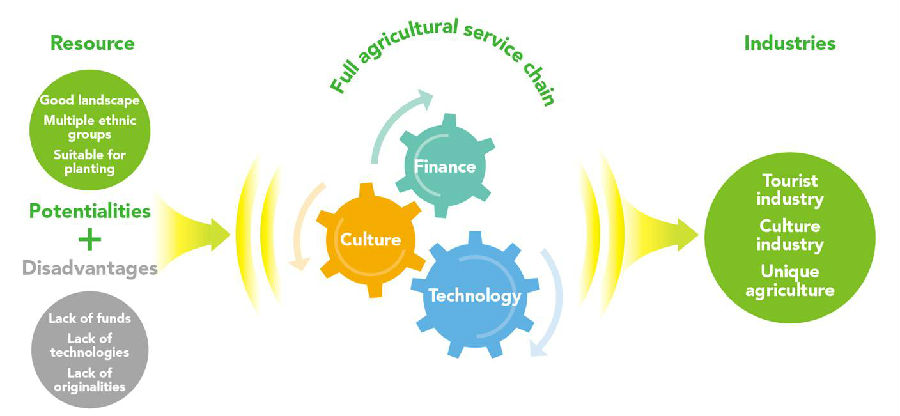Resource analysis of the village development
1. Policy support of the village development
Since the 18th CPC national congress, CPC central Committee and the State Council have issued a series of policies to support the village development. Village development is receiving more and more attentions. No. 1 central document has even become the proper noun to show that the CPC central committee is taking very seriously of the rural problems. It emphasize that the “three rural issues” is “the most important of the top priorities” in China’s socialism modernization period.
2. Problems and thinking in village development
2.1 Problems in village development
(1) A large deal of efforts were spent to improve the appearance of the villages. Hardware remediation can’t really promote the healthy evolution of rural space, attract population return. It can’t achieve the comprehensive improvement of the rural politics, economy and culture.
(2) Comparatively more emphasis was placed on “offering”, and village was understood to be the “vassal” of industrialization and urbanization. Subsidies and support didn’t shape the inside accumulation from villages themselves. Villages didn’t gain the “hematopoiesis” function, didn’t gain the long-term endogenous development momentum.
(3) In the fast process of urbanization, village development was “kidnapped” by urban land finance. Villagers were forced to move into apartments, to change their life styles. Village’s competitive advantages were lost, and village’s rural and culture identities were also scattering and disappearing.
2.2 Thinking of village development
(1) Comprehensively drive forward the village development from single target to multiple targets.Set the multiple ideal village construction as the long-term goal from the very beginning of the development.Combing the actual condition and urgent needs,drive forward the village development gradually.
(2) The advance phase of village development is to convert the perspective of the urban and rural roles. Villages have their independent and unique values. Carefully build the villages as one type of spaces full of values; endorse rural area dominant role, and give same importance to village development as urban development.
(3) Pay attention to regional and cultural differences. Apply different strategies to different regions, different type of villages.
(4) Make full use of the construction enthusiasm and construction initiative of many different contributors. Government can focus on early phase investment and direction leading, encourage participations from market and social resources, and also the primary role of villagers.
3. Resource analysis of poor and remote areas
(1) Resource advantages
Good landscape: Green hills and blue waters, suitable for developing tourist industry.
Multiple ethnic groups: Traditional culture, minority cultures, suitable for developing culture industry
Suitable for planting: special agriculture, organic agriculture, suitable for developing modern agriculture
(2) Resource disadvantages
Lack of funds, no financial means
Lack of technologies, no technological means
No originalities, no cultural means
Taihor and the whole agricultural service chain
The “Full agricultural service chain” launched by Taihe, was formed by researchers, industrialists and volunteers. The aim is to promote the synergetic development of tourism, culture and agriculture, achieve accurate poverty alleviation, build beautiful rural areas, and realize the great “Chinese Dream” by driving through technology, culture, and finance, and following the model of “tourism enriches farmers, platform benefit farmers, industry prospers farmers”
The main purposes of the full agricultural service chain are the following:
1. Convert the resource potentialities to be the developing advantages of industry convergence. The three main elements of the full agricultural service chain, finance, technology, and culture exactly resolved the resource disadvantages, which including lack of funds, lack of technologies and lack of originalities in poor and remote areas.
2. The full agricultural service chain is a comprehensive supporting system:
pFor tourism oriented areas, develop green technologies and cultural ideas in supplementary, to make the green hills and blue waters more and more pleasant.
pFor minority culture oriented areas, develop cultural tourism, and also recreational, unique, and organic agriculture in supplementary.
pFor planting oriented areas, develop organic, green and technological agriculture, and also recreational and agricultural culture in supplementary.
3. The full agricultural service chain was built on the internet of counties, countries, and villages. It takes small towns, center villages and residential areas to be the “rural grass-root internet system” and sets different developing strategies for different systems according to its resource potentiality, and resource disadvantages. It can develop many different types and combination of types like “tourism driven type”, “cultural protection type”, “recreational agricultural type”, and so on.
4. On the basis of developing industry, working together with accurate poverty alleviation, cooperative production, and local governance, the full agricultural service chain is building sustainable new village industry system.
